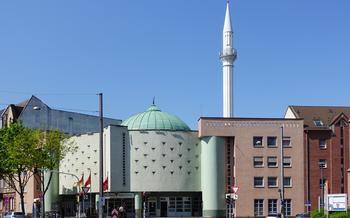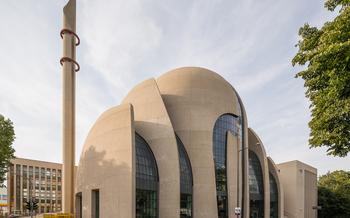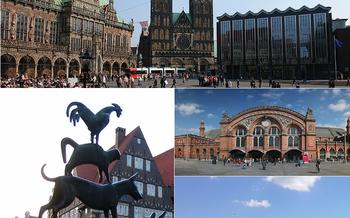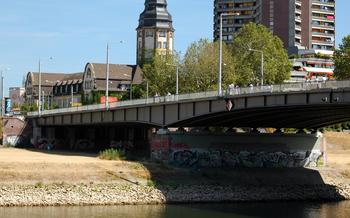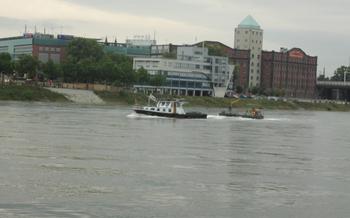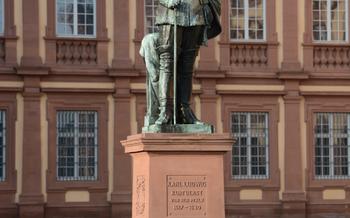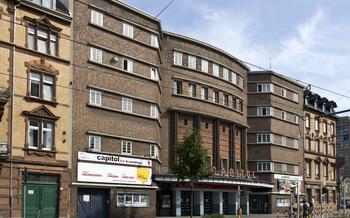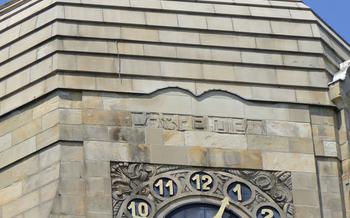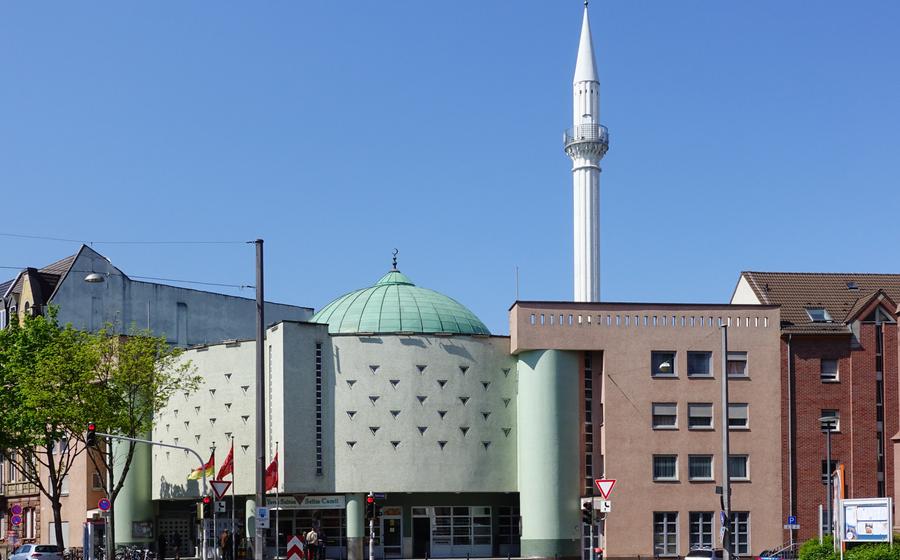
Mannheim Mosque
- Mannheim Mosque: A Symbol of Cultural Diversity
- Exploring the Mosque's Interior
- Witnessing the Call to Prayer:
- Prayer Halls and Facilities:
- Islamic Center and Community Activities
- Historical Context of the Mosque
- Architectural Highlights
- Weekday Activities and Programs
- Weekend Services and Events:
- Taking a Virtual Tour
- Traveling to the Mosque
- Capture the Beauty:
- Respectful Etiquette: Observing Cultural Norms
- Local Cuisine and Dining
- Insider Tip: Unveiling the Hidden Gems of Mannheim's Muslim Community:
Mannheim Mosque: A Symbol of Cultural Diversity
At the heart of Mannheim, Germany, stands an iconic landmark that encapsulates the city's rich multicultural tapestry - the Mannheim Mosque. This magnificent structure, inaugurated in 1995, serves as a beacon of religious harmony and cultural exchange, attracting visitors from all walks of life.
With its towering minarets piercing the sky and intricate tilework adorning its facade, the Mannheim Mosque showcases a blend of traditional Islamic architecture and modern design. It has become an integral part of the city's skyline, symbolizing Mannheim's commitment to inclusivity and religious tolerance.
The mosque is a testament to the city's diverse population, where individuals from various cultural and religious backgrounds coexist peacefully. Its presence reflects Mannheim's history as a melting pot of cultures, where people from different nations and faiths have come together to create a vibrant and harmonious community.
Exploring the Mosque's Interior
Embarking on a guided tour of the Mannheim Mosque offers a profound insight into its architectural grandeur and spiritual significance. These tours, typically led by knowledgeable guides, provide an opportunity to delve into the history, symbolism, and unique features of the mosque. Visitors are encouraged to inquire about available tour times and make reservations in advance to ensure a comprehensive and enriching experience.
Upon entering the mosque, visitors are greeted by a serene and tranquil atmosphere, conducive to contemplation and reflection. The dress code for visitors is modest and respectful, adhering to Islamic customs and traditions. Women are required to cover their heads with a headscarf, while men are expected to dress modestly.
The interior of the mosque exudes an aura of serenity and spirituality, with its elegant chandeliers, intricate tilework, and soft lighting. The main prayer hall, adorned with traditional Islamic motifs and calligraphy, serves as the focal point of the mosque. Visitors are welcome to explore the various sections of the mosque, including the prayer halls, library, and educational facilities.
Witnessing the Call to Prayer:
At the heart of the Mannheim Mosque's spiritual essence lies the mesmerizing call to prayer, known as the Adhan. This sacred invocation, traditionally chanted by the muezzin from the mosque's minaret, resonates through the city, inviting believers and passersby alike to join in prayer and contemplation.
The Adhan, with its distinct melody and powerful lyrics, holds deep significance in Islam, marking the five daily prayer times and summoning the faithful to gather in unity. As the muezzin's voice echoes across Mannheim's urban landscape, it creates a profound sense of tranquility and serenity, inviting all to pause and connect with the divine.
Experience the spiritual essence of the Mannheim Mosque by witnessing this captivating call to prayer. Let its melodic tones wash over you, transporting you to a realm of spirituality and inner peace, regardless of your religious beliefs.
Prayer Halls and Facilities:
The Mannheim Mosque boasts separate prayer halls for men and women, providing dedicated spaces for worshippers to connect with their faith. These halls are designed to accommodate large congregations, ensuring ample room for individuals to perform their prayers in comfort and tranquility.
Ablution facilities, essential for ritual cleansing before prayers, are conveniently located within the mosque. These facilities consist of designated areas with running water and amenities for both men and women, ensuring that worshippers can purify themselves in accordance with Islamic teachings.
Prayer times at the Mannheim Mosque adhere to the Islamic lunar calendar, with five daily prayers observed throughout the day. During these times, the mosque transforms into a vibrant hub of activity, as worshippers gather to perform congregational prayers in unity. The melodious recitation of the Quran and the synchronized movements of the congregation create a spiritually uplifting atmosphere that resonates throughout the mosque.
Islamic Center and Community Activities
Beyond its religious significance, the Mannheim Mosque serves as an active Islamic center, fostering a vibrant community and promoting understanding. It plays a crucial role in educating the public about Islamic culture and faith, dispelling misconceptions, and fostering interfaith dialogue. The mosque hosts regular events and programs aimed at building bridges between different communities.
Educational initiatives include Quran classes, lectures on Islamic history and culture, and workshops on contemporary issues. These programs provide a platform for open discussion, promoting understanding and cooperation. The mosque also organizes cultural events, such as art exhibitions, film screenings, and traditional music performances, to showcase the rich heritage of the Muslim community.
Community outreach is a vital aspect of the mosque's activities. It collaborates with local organizations, religious institutions, and educational institutions to promote interfaith dialogue and foster mutual respect. The mosque actively participates in community events, such as interfaith gatherings, charity drives, and peace walks, demonstrating its commitment to building a cohesive and harmonious society.
Historical Context of the Mosque
Mannheim, a city with a rich and diverse history, has long embraced religious tolerance and coexistence. The Mannheim Mosque stands as a testament to this spirit, embodying the city's commitment to religious freedom.
In the 19th century, Mannheim experienced a significant influx of Muslim immigrants, primarily from the Ottoman Empire. These immigrants, seeking a place of worship and community, established the first Muslim prayer room in the city in 1880. As the Muslim population grew, the need for a larger and more permanent structure became evident.
In 1930, the Islamic Association of Mannheim was founded, paving the way for the construction of the Mannheim Mosque. The mosque's foundation stone was laid in 1932, and the imposing edifice was completed in 193It was one of the first purpose-built mosques in Germany and remains a significant landmark in Mannheim's religious landscape.
The Mannheim Mosque not only serves as a place of worship but also plays a crucial role in preserving Islamic heritage and promoting interfaith dialogue. It stands as a symbol of the city's commitment to religious diversity and its rich multicultural identity.
Architectural Highlights
The Mannheim Mosque boasts a captivating blend of architectural styles, showcasing both traditional Islamic elements and modern design influences. Its towering minarets, reaching towards the sky, symbolize the connection between heaven and earth. These slender towers, adorned with intricate carvings and patterns, serve as a beacon of faith and a testament to the mosque's grandeur.
The exterior of the mosque is embellished with exquisite tilework and mosaics, creating a mesmerizing visual tapestry. These intricate designs, often featuring geometric patterns and floral motifs, reflect Islamic artistic traditions and add a touch of elegance to the mosque's facade.
The dome of the mosque is a remarkable architectural feat, symbolizing the unity of the Islamic community. Its graceful curvature and intricate ornamentation draw the eye upward, inspiring a sense of awe and reverence. The dome's unique design allows for natural light to filter into the prayer hall, creating a serene and uplifting ambiance.
Weekday Activities and Programs
The Mannheim Mosque offers a range of weekday activities and programs that cater to the diverse needs of the Muslim community. These programs foster a sense of spiritual growth, education, and social engagement among the mosque's congregation.
A highlight of the weekday schedule is the Quran classes, where individuals of all ages and backgrounds can delve into the teachings of the holy book. These classes provide a platform for learning about Islamic principles, enhancing understanding of the Quran's message, and engaging in thought-provoking discussions.
In addition to religious teachings, the mosque organizes social events and community gatherings that promote a sense of belonging and camaraderie. These events include potluck dinners, sports tournaments, and family-friendly activities. They provide an opportunity for members of the community to interact, socialize, and strengthen their bonds.
The weekday programs at the Mannheim Mosque also include opportunities for cultural exchange. Visitors and members alike can participate in workshops, lectures, and exhibitions that showcase Islamic art, music, and traditions. These events promote cross-cultural understanding and create a space for dialogue and collaboration.
Weekend Services and Events:
On weekends, the Mannheim Mosque transforms into a hub of religious and cultural activities, attracting a diverse congregation of worshippers and visitors. Special prayers, sermons, and lectures are held, delving into various aspects of Islamic teachings and spirituality. These gatherings offer a profound opportunity for spiritual reflection and learning.
The celebration of Islamic festivals and holidays adds vibrancy and joy to the mosque's atmosphere. Eid al-Fitr, Eid al-Adha, and Mawlid al-Nabi are among the significant events marked with fervor and enthusiasm. During these festivities, the mosque organizes special prayers, communal meals, and cultural performances that showcase the richness and diversity of Islamic traditions.
Community gatherings and cultural events further enhance the mosque's role as a social and cultural center. These events provide a platform for Muslims and non-Muslims to interact, share experiences, and build bridges of understanding. Through these initiatives, the mosque fosters a sense of belonging, promotes interfaith dialogue, and contributes to the cultural tapestry of Mannheim.
Taking a Virtual Tour
For those unable to visit the Mannheim Mosque in person, a virtual tour offers a unique opportunity to explore its interior and learn about its significance. The mosque's website features an interactive virtual tour that allows visitors to navigate through the mosque's various spaces, including the prayer halls, courtyard, and minarets. The tour provides detailed information about the mosque's history, architecture, and cultural significance, making it an immersive and educational experience.
Through the virtual tour, visitors can explore the mosque's intricate tilework, admire the stunning views from the minarets, and experience the tranquil atmosphere of the prayer halls. The tour also offers insights into the daily life of the mosque, including prayer times, educational programs, and community events.
Whether you are a history buff, an architecture enthusiast, or simply curious about Islamic culture, the virtual tour of the Mannheim Mosque provides an accessible and engaging way to explore this important landmark.
Traveling to the Mosque
The Mannheim Mosque is conveniently located in the heart of the city, making it easily accessible by public transportation. Take the S-Bahn or tram to the "Moschee" stop, and you'll find yourself right outside the mosque's gates. From there, you can marvel at the mosque's stunning exterior and soak in the vibrant atmosphere of the surrounding neighborhood.
After your visit to the mosque, take some time to explore the nearby attractions. The Mannheim Palace, with its impressive Baroque architecture, is a must-see. The Luisenpark, a sprawling park with gardens, playgrounds, and a petting zoo, is perfect for a leisurely stroll or a fun-filled family day out. And for a taste of Mannheim's vibrant arts scene, head to the Kunsthalle Mannheim, which showcases a diverse collection of modern and contemporary art.
To make the most of your visit, plan your itinerary carefully. Consider combining your visit to the mosque with a tour of the Mannheim Palace and a relaxing afternoon at the Luisenpark. This will give you a comprehensive overview of Mannheim's rich history, culture, and natural beauty.
Capture the Beauty:
The Mannheim Mosque's architectural splendor and serene ambiance present a captivating subject for photography enthusiasts. However, it's crucial to adhere to specific guidelines and etiquette while capturing the beauty of this sacred space.
- Photography Guidelines:
- Visitors are generally permitted to take photographs within the mosque's premises, but it's essential to prioritize respect and discretion.
- Avoid using flash photography, as it can be disruptive during prayers or other religious activities.
- Refrain from capturing images of individuals without their consent, especially during prayer or other private moments.
-
Maintain a respectful distance from the prayer halls and avoid entering them during prayer times.
-
Tips for Stunning Shots:
- To capture the mosque's imposing exterior, consider using a wide-angle lens to encompass its grandeur.
- Experiment with different angles and perspectives to showcase the intricate details of the minarets, dome, and tilework.
- Play with natural light to enhance the vibrancy of the colors and textures, particularly during golden hour.
-
Utilize a tripod for stability, especially when shooting in low-light conditions or capturing long exposures.
-
Sharing Your Experiences:
- Share your stunning captures on social media, but be mindful of the privacy of others and obtain permission before posting images of individuals.
- Include relevant hashtags such as #MannheimMosque, #IslamicArchitecture, and #TravelPhotography to connect with a broader audience and showcase the beauty of this cultural landmark.
- Accompany your photographs with informative captions that provide insights into the mosque's history, significance, and your personal experience.
Respectful Etiquette: Observing Cultural Norms
When visiting the Mannheim Mosque, it is essential to maintain respectful etiquette to honor the sacred space and the cultural norms of the Muslim community. As a guest, it is crucial to be mindful of your behavior and actions to ensure a peaceful and harmonious environment.
Before entering the mosque, it is customary to remove your shoes and place them in the designated shoe racks. This practice signifies respect for the cleanliness and sanctity of the prayer halls. It is also advisable to dress modestly and appropriately, covering your shoulders and knees. While headscarves are not mandatory for female visitors, it is a gesture of respect to cover your head as a sign of reverence.
It is important to maintain silence and avoid any disruptions while inside the mosque. This allows worshippers to focus on their prayers and maintain a serene atmosphere. Refrain from loud conversations, laughter, or any behavior that may disturb the tranquility of the space.
Before entering the prayer halls, it is customary to seek permission from the imam or a mosque official. This gesture shows respect for the sanctity of the space and ensures that you do not disrupt any ongoing prayers.
Remember, the Mannheim Mosque is not only a place of worship but also a symbol of cultural diversity and understanding. By observing respectful etiquette, you not only contribute to the harmonious coexistence of different faiths but also enrich your own experience of this sacred space.
Local Cuisine and Dining
Enrich your visit to the Mannheim Mosque by exploring the city's culinary delights. Mannheim offers a diverse range of halal restaurants and cafes catering to Muslim visitors. Indulge in traditional Middle Eastern cuisine, savor the flavors of Turkish specialties, or explore the vibrant culinary scene of neighboring countries.
Sample the succulent kebabs, aromatic biryani, and creamy hummus at one of the many Turkish restaurants in the city. For a taste of authentic Arabian cuisine, try the mouthwatering shawarma or the fragrant makloubeh. Don't miss the opportunity to experience the unique flavors of Pakistani cuisine, known for its rich curries and hearty dishes.
Beyond halal dining options, Mannheim boasts a vibrant culinary scene with something to satisfy every palate. From cozy cafes serving freshly baked pastries to Michelin-starred restaurants showcasing innovative dishes, Mannheim's culinary landscape is as diverse as its cultural heritage.
Combine your cultural experiences with gastronomy by visiting the weekly market on Marktplatz, where you can find fresh produce, local delicacies, and international specialties. Enjoy a leisurely lunch at one of the many outdoor cafes, savoring the lively atmosphere of the city center.
Mannheim's culinary offerings are a testament to its multicultural identity, where diverse flavors and traditions blend to create a vibrant and welcoming dining scene.
Insider Tip: Unveiling the Hidden Gems of Mannheim's Muslim Community:
Delve deeper into the vibrant Muslim community of Mannheim by attending special events and festivals throughout the year. These celebrations offer a unique opportunity to immerse yourself in the rich Islamic culture and traditions. Participate in lively discussions, savor delicious halal cuisine, and witness captivating performances that showcase the diverse talents of the community.
To fully embrace the local Muslim experience, consider engaging with community members and seeking their recommendations for hidden gems and lesser-known attractions. They can guide you to authentic halal restaurants, introduce you to local customs and traditions, and share insider tips for exploring the city like a local. By embracing the warmth and hospitality of the Muslim community, you'll gain a deeper understanding of their culture and create lasting memories of your time in Mannheim.
